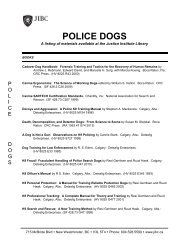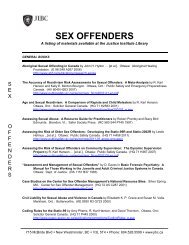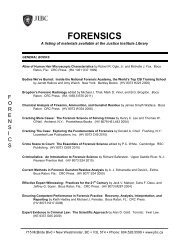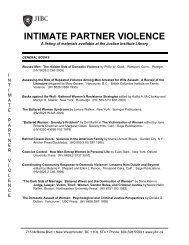legally speaking - Justice Institute of British Columbia
legally speaking - Justice Institute of British Columbia
legally speaking - Justice Institute of British Columbia
Create successful ePaper yourself
Turn your PDF publications into a flip-book with our unique Google optimized e-Paper software.
seeks to balance two competing<br />
objectives: (1) the police must<br />
have considerable leeway in the<br />
t e c h n i q u e s t h e y u s e t o<br />
investigate criminal activity but<br />
(2) at the same time their power<br />
to investigate should not be<br />
untrammeled. “The police<br />
should not be allowed to<br />
randomly test the virtue <strong>of</strong><br />
citizens by <strong>of</strong>fering them an<br />
opportunity to commit a crime<br />
without reasonable suspicion<br />
that they are already engaged in criminal activity; or<br />
worse, to go further and use tactics designed to<br />
induce citizens to commit a criminal <strong>of</strong>fence,” said<br />
<strong>Justice</strong> Laskin. “To allow these investigative<br />
techniques would <strong>of</strong>fend our notions <strong>of</strong> decency and<br />
fair play.” When entrapment is proven the essential<br />
elements <strong>of</strong> the <strong>of</strong>fence have been made out but a<br />
court will stay the proceedings because fair play<br />
would be <strong>of</strong>fended and the administration <strong>of</strong> justice<br />
would be brought into disrepute.<br />
Entrapment can occur in two ways:<br />
1. Government authorities provide a person with<br />
an opportunity to commit a crime without<br />
having a reasonable suspicion that the person<br />
is already engaged in criminal activity or they<br />
are acting in the course <strong>of</strong> a bona fide<br />
investigation. An investigation will be bona<br />
fide when it is directed at a geographic area<br />
where criminal activity is reasonably<br />
suspected. When police have a reasonable<br />
suspicion that criminal activity is occurring in<br />
an area they are entitled to provide any person<br />
in the area with the opportunity to commit the<br />
<strong>of</strong>fence. Thus, police can lawfully act only on<br />
reasonable suspicion, either <strong>of</strong> an individual’s<br />
or an area’s criminal activity.<br />
2. Government authorities, though having a<br />
reasonable suspicion or acting in the course <strong>of</strong><br />
a bona fide investigation, go beyond providing<br />
an opportunity to commit a crime by inducing<br />
the commission <strong>of</strong> an <strong>of</strong>fence.<br />
Volume 11 Issue 1 - January/February 2011<br />
“The police should not be allowed to<br />
randomly test the virtue <strong>of</strong> citizens<br />
by <strong>of</strong>fering them an opportunity to<br />
commit a crime without reasonable<br />
suspicion that they are already<br />
engaged in criminal activity; or worse,<br />
to go further and use tactics<br />
designed to induce citizens to commit<br />
a criminal <strong>of</strong>fence.”<br />
PAGE 13<br />
In this case the accused did<br />
not suggest that anyone<br />
threatened him or induced<br />
him to sell cigarettes to the<br />
test shopper.<br />
Smoke Free Ontario Act<br />
Th e C o u r t o f A p p e a l<br />
rejected the notion that a<br />
reasonable suspicion should<br />
be required for compliance<br />
checks under the Smoke<br />
Free Ontario Act. Here, the Crown conceded that<br />
the authorities acted without a reasonable suspicion.<br />
They neither reasonably suspected that the accused<br />
or the stores in the area were engaged in illegal<br />
activity before using the test shopper. But <strong>Justice</strong><br />
Laskin ruled that the authorities could undertake a<br />
bona fide investigation into whether stores in the<br />
area were selling tobacco to minors without a<br />
reasonable suspicion.<br />
The Smoke Free Ontario Act is a regulatory statute<br />
promoting public health and safety. “It establishes a<br />
legislative regime for controlling the display,<br />
promotion, packaging, sale and use <strong>of</strong> tobacco,<br />
including when, how, where and to whom tobacco<br />
can be sold,” said <strong>Justice</strong> Laskin. “The <strong>of</strong>fences<br />
under the Act are strict liability <strong>of</strong>fences, which<br />
means that due diligence is a defence but<br />
negligence is not. All <strong>of</strong>fences are punishable by a<br />
fine, or, on multiple convictions, by a prohibition on<br />
the sale <strong>of</strong> tobacco for up to 12 months. No one can<br />
be imprisoned for a breach <strong>of</strong> the statute.” Section<br />
3(1) prohibits the sale or supply <strong>of</strong> tobacco to a<br />
person under 19 while s. 3(2) requires vendors to<br />
check for identification when the customer appears<br />
to be under 25.<br />
The reasonable suspicion requirement does not<br />
apply to the <strong>of</strong>fence <strong>of</strong> selling tobacco to a minor<br />
and government authorities can use random test<br />
shopping to monitor compliance with the statute as<br />
long as the random test shopping is done in good<br />
faith. It cannot be done in a discriminatory way<br />
(such as targeting only stores owned by a particular<br />
ethnic group) or for an improper purpose. The twin<br />
rationales underpinning the reasonable suspicion






